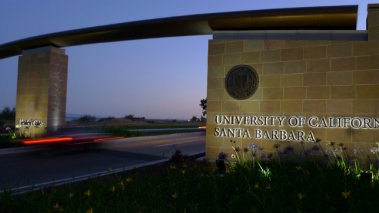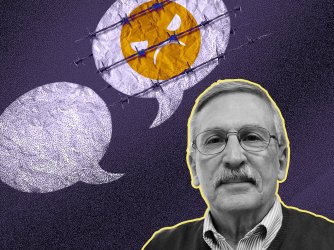Table of Contents
Appellate court: UCSB denied accused student ‘even a semblance of due process’

Flickr
On Tuesday, a panel of California appellate judges issued a scathing opinion ruling that the University of California, Santa Barbara denied a fair hearing to a student accused of sexual misconduct. The court wasted no time explaining what the university had done wrong:
John [Doe, the accused student] was denied access to critical evidence; denied the opportunity to adequately cross-examine witnesses; and denied the opportunity to present evidence in his defense. UCSB denied John a fair hearing.
Unlike most campus sexual misconduct cases, the question in this case was not whether the sexual contact between John Doe and his accuser, Jane Roe, had been consensual. The question was whether there had been any sexual contact at all. Jane, a friend of both John and John’s girlfriend, came back to their room after a party at which both John and Jane had been drinking. Both John and Jane ended up falling asleep, fully clothed, on a mattress in the living room where John’s girlfriend and another eyewitness were sitting. This is where their accounts diverge dramatically.
According to John, Jane woke up screaming that someone was hurting her, and he thought she must have been having a nightmare.
According to Jane, John sexually assaulted her on the mattress.
Both John’s girlfriend and the other eyewitness provided testimony in the on-campus proceeding stating that Jane’s allegations were “not physically possible.” John’s girlfriend additionally reported that “[s]he saw Jane wake up in the bed confused, disoriented, and mumbling in foreign languages that [John’s girlfriend] did not speak. She thought Jane was having a bad dream.”
The parties raised two major factual issues at the on-campus hearing. The first was whether side effects of Viibryd, the antidepressant that Jane was taking, could have caused her to have a vivid nightmare of being assaulted. John did not learn the identity of the medication Jane was taking until the night before the hearing, when the university, after much delay, provided him with the hearing packet. John’s mother called the drug manufacturer and sought to testify at John’s hearing about what she had learned — namely, that the side effects of Viibryd may include “hallucinations and sleep paralysis and night terrors” that can be exacerbated by combining the medication with alcohol.
When John questioned Jane at the hearing about the side effects of Viibryd, Jane declined to answer, stating “It’s my private medical information.” John’s mother attempted to testify about what she had learned about side effects from her call to the drug manufacturer, but the university’s general counsel objected that she did not “have the expertise to lay the foundation for this type of evidence.”
The state appellate court was appalled by the impossible “catch-22” in which the university had placed John by only giving him the hearing packet the night before the hearing: “[H]e learned the name of the medication Jane was taking too late to allow him to obtain an expert opinion, but the Committee precluded John from offering evidence of the side effects of Viibryd without an expert.”
UCSB’s refusal to allow any questioning about the side effects of Viibryd was particularly prejudicial to John, the court held, since “Jane’s behavior, as described by eyewitness one, was consistent with John’s theory that Jane was experiencing the side effects of consuming alcohol while taking Viibryd.”
The second factual issue related to the report from a medical exam performed by the Santa Barbara County Sexual Assault Response Team. Although “[t]he complete SART report was not produced at the hearing or disclosed to John or his counsel,” a detective was allowed to testify about an email she sent during the investigation stating that “the SART report states ‘there was bruising/laceration noted in the anal area.’”
Because neither John nor the hearing panel had the actual SART report, no one was able to meaningfully question the detective about what language in the report itself had prompted her email. Nor was anyone able to ask questions about what other findings were in the report, what else might have caused any bruising or laceration that was noted in the report, or anything beyond the detective’s personal recollection of one line of the report.
The court took a particularly dim view of this, writing that “[t]o argue that it is fair to allow the detective to testify about the contents of the SART report, but preclude the accused and the trier of fact from seeing the report, strains credulity.” In short, the court said, “The accused must be permitted to see the evidence against him. Need we say more?” (Emphasis added.)
The court concluded its opinion with a broader statement about the importance of due process, not only to the accused, but also to accusers:
It is ironic that an institution of higher learning, where American history and government are taught, should stray so far from the principles that underlie our democracy. This case turned on the Committee’s determination of the credibility of the witnesses. Credibility cannot be properly decided until the accused is given the opportunity to adequately respond to the accusation. The lack of due process in the hearing here precluded a fair evaluation of the witnesses’ credibility. In this respect, neither Jane nor John received a fair hearing.
This powerfully written opinion is one of a number of recent court decisions holding that universities too often deny accused students even the most basic protections when adjudicating claims of serious misconduct. FIRE will keep you updated as this area of the law continues to develop.
Recent Articles
FIRE’s award-winning Newsdesk covers the free speech news you need to stay informed.

Should the First Amendment protect hate speech?
In America, hate speech is generally protected by the First Amendment. But should it be? Today's guest is out with a new book, "." W. Wat Hopkins is emeritus professor of communication at Virginia Tech, where he taught communication law and...

Here’s what students need to know about protesting on campus right now

Kansas takes a stand for intellectual freedom
